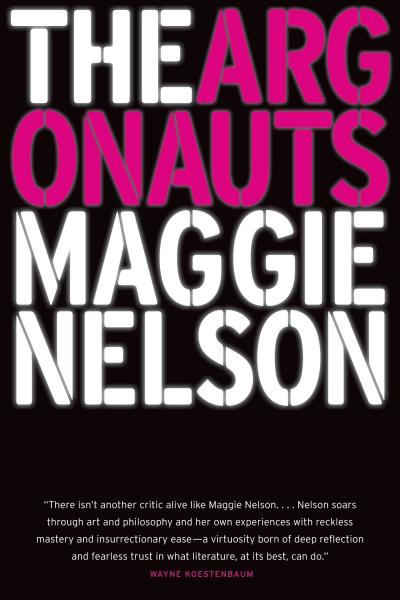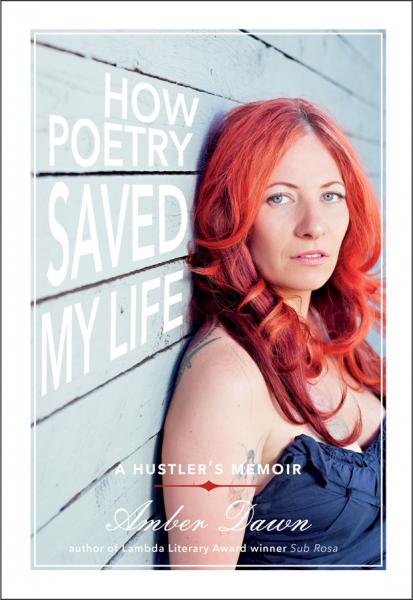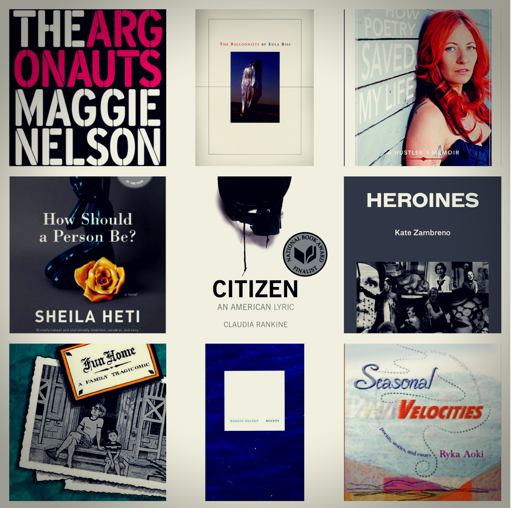With the deadline for Room’s Short Forms contest less than two months away (closing on January 15, 2017), Mica Lemiski discusses genre-bending writing and what it means to step outside literary conventions, using Maggie Nelson and Amber Dawn as examples.
With the deadline for Room’s Short Forms contest less than two months away (closing on January 15, 2017), Mica Lemiski discusses genre-bending writing and what it means to step outside literary conventions, using Maggie Nelson and Amber Dawn as examples.
I removed the slim, black book from my suitcase, slid it out from where it had been sandwiched between T-shirts.
Next to me, my friend stared at the book’s pink and white title. “The Argonauts,” she said. “Maggie Nelson. Hm. Any good?”
“Oh, yeah,” I said. “This woman is brilliant.”
“So what’s it about? What kind of book is it?”
I fumbled my way through an answer. “Well it’s, uh, part-memoir and, you know, there’s some criticism and maybe even poetry. Well, no, not poetry but its poetic, if you know what I mean. And there’s a lot of theory, too. So she’ll quote someone—Susan Sontag, let’s say—and then she’ll respond to it, as if in conversation with that person. And so it’s about the narrator and her marriage to an artist, Henry, who is genderqueer. It’s about motherhood too, but also sex, queer sex, or maybe sex in general.”
My friend looked a bit overwhelmed. Maybe she expected me to say “it’s a novel about a girl who goes missing” or “it’s a memoir about addiction.” Instead, I gave her a somewhat clunky summation of a book that defies straightforward classification—and quite purposefully so. Because in refusing to be labelled strictly as, say, memoir or criticism, Nelson’s Argonauts makes a point about categorization and how it applies to issues of the broader culture—sex, gender, queerness, and motherhood in particular. How and why do we label? Is there a point at which language, and the ideas that inform it, limit and compartmentalize us?
 One of the most compelling aspects of The Argonauts is how its rebellious content (see: Maggie’s thoughts on sodomy in conjunction with motherhood) echoes its unconventional form (see: my failed attempt to categorize the book in conversation). During an interview with Allie Rowbottom, Nelson explained her philosophy on genre through an Eileen Myles quote:
One of the most compelling aspects of The Argonauts is how its rebellious content (see: Maggie’s thoughts on sodomy in conjunction with motherhood) echoes its unconventional form (see: my failed attempt to categorize the book in conversation). During an interview with Allie Rowbottom, Nelson explained her philosophy on genre through an Eileen Myles quote:
“I think literary categories are false. They belong to the marketplace and the academy. It’s the obedience issue that I’m saying fuck you to, the scholar or the editor trying to trap the writer like a little bug under the cup of ‘poetry’ or ‘prose.’”
When I see words like “marketplace” and “the academy,” I can’t help but see another word: “patriarchy.” And so if literary categories were born of a patriarchy, in which categorization and heteronormativity are paramount, perhaps Myles and Nelson are suggesting that, in writing something that defies categorization in both subject and form, they are pushing themselves into a marginalized space—a queer space, even. The Argonauts, then, may navigate the realms of both gender and genre queerness.
To me, there is something freeing about this, about viewing literary form as something more fluid than what we’ve been taught in school and university, within the aisles of our libraries and our neighborhood Chapters. There is something liberating about a book that says, hey, that’s actually not the way I want to do things. Let me present this in my own form, whatever that may be. Let you try and label it, but let you not succeed.
One of the first genre-blurring books I read was Amber Dawn’s How Poetry Saved My Life. The book is a combination of memoir, nonfiction and poetry, and while I read it, quickly and feverishly on my porch in August, I remember thinking, what is this?
I knew I liked it; I knew it had grabbed me, touched me, in a way that was irreversible. But the book also confused me deeply because, prior to reading Amber Dawn, I didn’t know you could put poetry inside a memoir.
But why not? And why had I grown up thinking that blending form was something writers simply did not do? That it was wrong, even? Maybe because every class, every seminar, has a label. Fiction, Poetry, Creative Non-Fiction. The big three.
I’m not saying that all classification is bad or creatively limiting—it would be impossible to navigate a library if there weren’t some sense of order—but I remain confused as to why hybrid genres have remained largely unrecognized, undiscussed.
In an interview with The Town Crier, Amber Dawn speaks to why she chose to navigate a variety of forms in How Poetry Saved My Life:
 “As a sex worker, survivor of multiple-perpetrator abuse and a transgressive queer femme, putting a memoir into the world was an act of resistance of the pervasive stigma and silencing I, and my communities, face. I wrote prose because readers buy prose. Prose is accessible in its messaging, and it is market-friendly…However, I could not speak my truth through prose alone and opted to include 18 poems in the book. Poetry offered me more dynamism and aggregateness than prose. These poems often mark where my story, values, and emotions are the most complex and vulnerable—my memories of missing and murdered women in Vancouver’s Downtown Eastside are told solely through poetry, as they are anytime I write about my wife.”
“As a sex worker, survivor of multiple-perpetrator abuse and a transgressive queer femme, putting a memoir into the world was an act of resistance of the pervasive stigma and silencing I, and my communities, face. I wrote prose because readers buy prose. Prose is accessible in its messaging, and it is market-friendly…However, I could not speak my truth through prose alone and opted to include 18 poems in the book. Poetry offered me more dynamism and aggregateness than prose. These poems often mark where my story, values, and emotions are the most complex and vulnerable—my memories of missing and murdered women in Vancouver’s Downtown Eastside are told solely through poetry, as they are anytime I write about my wife.”
I am in love with Dawn’s dedication to her own purpose here. Her choice of form is both strategic and utterly natural. Prose for the sake of visibility; poetry for the sake of emotion, urgency, the fragmentation inherent in her lived experiences. I imagine Nelson nodding along with Dawn’s statement, as her own philosophies seem in agreement: “The taxonomy of how the piece eventually needs to take form isn’t really so important,” says Nelson. “Or, rather, how the piece eventually takes form is very important, but form for me comes out of the imperatives of content.”
Of course, Dawn and Nelson aren’t the only writers working outside the conventions of literary form. Below is just a sample of texts that navigate form and genre in a way we might call “queer.”
The Argonauts, by Maggie Nelson (criticism, memoir, “autotheory”)
The Balloonists, by Eula Biss (prose poetry, memoir, essays)
Bluets, by Maggie Nelson (poetry, memoir, philosophy)
Citizen: An American Lyric, by Claudia Rankine (longform poetry, criticism)
Fun Home: A Family Tragicomic, by Alison Bechdel (graphic novel, memoir, theory)
Heroines, by Kate Zambreno (memoir, history, criticism)
How Poetry Saved My Life, by Amber Dawn (memoir, poetry)
How Should A Person Be?, by Sheila Heti (memoir, fiction, self-help, philosophy)
Last Letters from Hav, by Jan Morris (travel writing, memoir, speculative fiction)
Random Family, By Adrian Nicole LeBlanc (narrative non-fiction)
Seasonal Velocities, by Ryka Aoki (short fiction, poetry, essays)
Taking inspiration from the texts and authors above, we at Room invite you to submit your short form pieces, whatever genre they may be, to our upcoming contest. Bend a genre, break a rule—we’re all for it.














